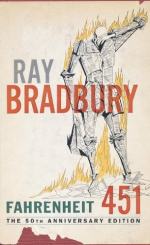|
This section contains 2,269 words (approx. 8 pages at 300 words per page) |

|
SOURCE: "The Post-Apocalyptic Library: Oral and Literate Culture in Fahrenheit 451 and A Canticle for Leibowitz," in Extrapolation, Vol. 32, No. 4, Winter, 1991, pp. 331-42.
In the following excerpt, Spencer examines oral tradition, textual knowledge, and their respective implications for memory and power as demonstrated in Fahrenheit 451.
At the dawn of widespread literacy in fourth-century Athens, Plato appended to the end of his Phaedrus a story that has often been perceived as, as Jacques Derrida puts it, "an extraneous mythological fantasy." Derrida argues in Dissemination that there is nothing extraneous about the myth at all, but rather it is an expression of an important and timely idea with which the classical Athenians were concerned. Recent orality/literacy theory, as outlined by Eric A. Havelock, Walter S. Ong, and others, would seem to back him up. The story is that of the discovery of the technology of writing, a tale that Socrates...
|
This section contains 2,269 words (approx. 8 pages at 300 words per page) |

|


